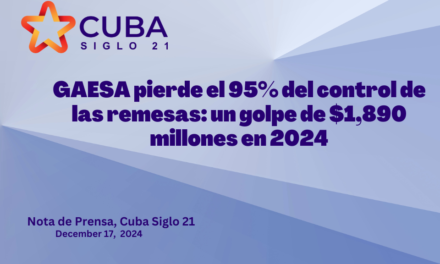Descargar informe completo PDF Español
Download Complete Report PDF English
Ver resumen español
See Summary in English
September 4, 2024- The new Dossier published by Cuba Siglo 21 “Transportation crisis in Cuba: another ‘achievement’ of GAESA”, written by prominent economist Emilio Morales, exposes the crisis facing the transportation system in Cuba. The author points to GAESA, the military conglomerate that monopolizes the island’s economy, as the main culprit.
The report details how the transportation sector, which in the 50s of the last century was a regional reference, is today on the verge of collapse. According to the document, all modes of transportation in Cuba (land, sea, air and rail) are in a critical state, seriously affecting both the economy and the daily life of the population.
Cuba was a pioneer in the use of railroads worldwide and, during the 1950s, it had one of the most advanced transportation systems in the region. However, at present, this system is in ruins, with a notable decline in the availability and quality of services in all its modalities.
GAESA, which controls the finances of practically all sectors in the country, including transportation, has led to a profound decapitalization of the sector. Transportation companies do not enjoy financial autonomy and depend on resources allocated by the State, which are insufficient to maintain and modernize the existing infrastructure.
Public transportation has suffered a significant decrease in the number of passengers transported. Compared to 2013, bus transportation has dropped 51.92%, and in relation to 2019, the drop is 56.54%. Insufficient maintenance, the shortage of spare parts and fuel, and the insufficient number of operational units have turned public transportation into a chaos, seriously affecting the daily life of citizens.
Inefficiency also extends to the transportation of goods, with a 49.49% drop in freight transported by automobile in the last 11 years. This reflects the financial crisis facing the country, where there are fewer and fewer products available for transport, due to the decrease in imports and low domestic production.
The rail system is in a critical situation. Sixty-seven percent of the railroad tracks require maintenance, and only 12 of the 34 locomotives needed are in operation. Rail freight transportation has fallen 70.28% since 2013. Lack of parts, theft of infrastructure components and widespread deterioration have paralyzed much of the system, affecting both the economy and the mobility of citizens.
Despite the government’s attempts to attract foreign investment in the transportation sector, organized fairs and exhibitions have failed to materialize significant investment contracts. The deterioration of the infrastructure continues with no hope of improvement in the short or medium term.
The transportation crisis has generated serious problems, such as the accumulation of garbage in the cities due to the lack of transportation for its collection, and the insufficient number of ambulances for medical emergencies, of which only 39.6% are operational. These problems have contributed to the general deterioration of living conditions in Cuba and have been a factor in the massive migration of the population in recent years.
The report concludes that GAESA’s absolute control over the country’s finances and investments has led to the collapse of the transportation system, accelerating Cuba’s overall economic deterioration. Investment in strategic sectors has been minimal, while investment in repressive forces and hotel constructions has been prioritized, relegating the needs of the population.
Morales closes the report with the statement that “with GAESA there is (and will be) no country”. The mafia state ran by GAESA is not interested in its development.
About the Author
Emilio Morales, president and CEO of Havana Consulting Group and vice president of Cuba Siglo 21 is a renowned analyst specializing in the Cuban economy. With more than 300 articles and two books published, Morales is an authoritative voice on issues related to Cuba’s market and economy.







